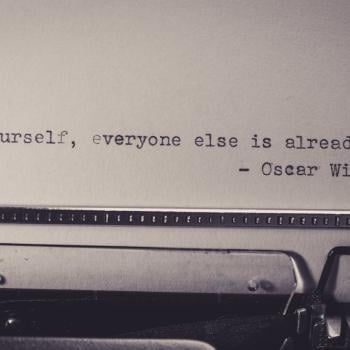What’s Wrong with Prayer?

The first prayer I ever really learned was simple but problematic. It went something like this:
Now I lay me down to sleep, I pray the Lord my soul to keep.
If I should die before I wake, I pray the Lord my soul to take.
There are some assumptions in this rhyming prayer, written in 1781 in New England. To begin with, it assumes that our soul is constantly in danger of being lost. Each night, this prayer assumes that our soul is once again in danger of being left behind, and we must remind God that we still want him to include us in the eternal plan. It is a consistent goal of religion to regularly reintroduce fear and unworthiness and the danger we face. Then, religion provides the solution to our fear.
This “be afraid,” but “it’s okay” pattern seems traumatizing to me now. If I remind myself to pray against the monsters in my closet, all I do is cause myself to start thinking about the monsters that are lurking there.
Many churches from my tradition had prayer services on Wednesday nights. The churches I attended and the ones I pastored never made this a practice. I suppose you must have some talented public prayer warriors and ours were always a little boring. Most of the prayer meetings I attended seemed a little like a gossip session and I usually could not wait for them to be over. My daily prayer was also somewhat of a disaster, even when I was a pastor. If I prayed in a comfortable position, prayer was more like sleeping pills than a beneficial practice.
I have followed prayer liturgies at times, but I still cannot acknowledge using other people’s words, even if they are straight from the Bible. Someone just wrote me a note, quoting something I said. It made me feel the same way as I do when people quote other people. When I am talking to someone, I want them to tell me what THEY think, not what I or someone else has said. Some people call prayers from the past “well-crafted” prayers, but reciting prayers still seems like copying a sermon or kissing my sister to me.
I did deeply enjoy praying with other people. In most instances, I would experience something deep happening between us and I always felt closer to them afterward. But was that because of the prayer? Was God there and doing something or was it just that I was connecting with another human being deeply? Since I have had some deep conversations with people online during the pandemic, I am inclined to believe it was the latter. It was a deep connection, but not necessarily me connecting with the Divine.
But, in another way, I WAS connecting with God. My current understanding is that God is in all things. In yoga, we say namaste’ which means “The Divine in me honors the Divine in you.” If God is present within us, then connecting is a deep connection that also has spiritual implications. Even when we are focusing with people, which is a healing practice, there is a deep connection, and it seems especially spiritual.
But before I talk about how I approach prayer; I should mention the issues I have with traditional prayer.
My Issues with Traditional Prayer
Let’s face it! The number one thing we do is pray for things we want. We either want God to do or reveal something to us. We may be praying on behalf of someone else, but we are asking that God do what we cannot or have not been able to do up to this point. It is mostly like petitioning our father. Since he has more power, influence, and money, we need him to make some things happen for us.
As you may know, I wrote the book Apparent Faith using the metaphor of a father. So, if we stick with that lens for now, we will have to assume that God wants to give us good things, open doors for us, and help us get the things that are good for us. The fact that he should already know these things is one part of this that I will not address right now, but it is obvious. Why should we have to tell him we want something he already knows we want, need, and desire?
So, just for now, I will give a little grace and assume prayer is just like the official asking so he can provide. It is a transaction and most Christians like a transaction they can refer to. I do this and God does that—it is duplicatable and works well in creating organizations and it is easy to teach.
But here is the problem I have with this little transactional type of prayer. Most of the time this prayer is not answered. I know every remnant of Christian DNA we have wants to argue with this, but it is true. We even had a little catchy phrase, “God always answers—it’s either yes, no, or wait.” But even that is not true. Sometimes we do not hear anything and just assume it is “no” or “wait.” And even then, why would he say “no” to something we need that is good for us? Or why would He ignore us?
What about serious things like my grandson’s condition? Why would he not heal Jackson if he could? And why does he need more people to ask him and why do we need to pray more fervently for him to do so? Or is God an asshole that is just toying with us while we suffer?
We do not know what is right to ask for; but if he knows, why doesn’t he correct us and teach us what to ask for? Some may argue that he does, but I have observed that most of those observations are just lessons learned from life over time that we would have learned anyway.
I must agree with Thomas Jay Oord that “God can’t.”1 He cannot intervene in the way we think he can. He is a part of us and participates with us. The very cells that make up our bodies are miraculous and always working for our good, but God does not usually violate the laws of creation. With that said, I will say that I have seen things I cannot explain; but I do not think God works the way we often think he does. And if he does work the way we used to think he does, He has a lot of explaining to do (just because of Jackson alone).
Traditional prayer is also essentially a form of bypassing. Instead of changing our lifestyle, we pray for better health. Instead of connecting with people, we ask God to change them. Instead of loving our enemies, we ask God to subdue them. The list is endless, so you can insert your examples.
We assume God is in control, so we start with our assumptions about how things should work, and we ask him to approve our request. We use spiritual language to avoid doing the difficult and necessary things we must do as humans. We find great power and wisdom when we go inward, but we keep hoping for a magic elixir from out there somewhere.
Spiritual bypassing is an epidemic in the Western church. We may have accidentally done some real shadow work when we were trying to cast out demons, but it is time to stop demon hunting and get down to the authentic work of healing. It is not easy, and we will have to feel it before we can heal it. Avoiding it only makes it come back in ways that we used to blame on Satan and now we know is simply the stuff we have been avoiding.
Prayer as Listening
Someone said, “Prayer is talking, meditation is listening.” I feel fortunate that I have found a mindfulness practice. My most common thing to do on the weekends or when I get some quiet time is to turn on a timer and meditate for about 20 minutes. I do not usually say mantras or ask for anything, I just clear my mind and enter a state of calm.
This does several things for me. Initially, it makes me aware of times when my body is trying to tell me something. As you know, this helps focus and even physical healing. When we become present with the tension held in our body, we can get a felt sense of trauma and other issues we need to address.
But also, meditation simply calms me. It releases busy thoughts for the moment and allows my body to just function without all the extra stress and negative energy of the day. My body not only relaxes but also seems to rejuvenate and restore itself even with just this small amount of time.
But the best benefit of mindfulness practices is that I get the best ideas. Sometimes it is something I need to say to someone. Other times, it is an idea for a blog or an answer to something I have been contemplating. I get such clarity, but most times without even asking the question. My inner self seems to know, even without petitioning, what is most needed for me at the time.
I learned this through the practice of centering prayer. Centering prayer is known by several names, but it is sitting without expectation for a certain amount of time. When thoughts try to invade our consciousness, the general practice is to say a word like “stillness” and return to the practice. It helped rid me of the need to ask for something or expect anything. I simply sit silently until I am done.
The Knowing
I am learning to trust myself. As you may know, religion taught us that we cannot trust ourselves. It discouraged emotions, feelings, and intuition because they were not trustworthy. But then we learned that God is within us (something Jesus told us, but we forgot). At the very least, we can trust that part of us that is God. But it is more than that.
There is a part of us that is our Isness. I am coming to believe that this part of us is also trustworthy. It is also eternal and divine itself, not just connected to the Divine. Again, the yogis say, “The Divine in me.” Increasingly I find that many of the answers I seek are found within. And it is like I already knew them; I just never accessed them or made the connection before.
So, it is not the asking, seeking, and knocking with which we are familiar. These kinds of things are not external to us but have always been within us. Once we realize that we do not know (in our minds), we can ask, seek, and knock in a new way. We do not go first to our dogma, then to others, then (outward) to God. Instead, we go inward to where our knowing resides.
Other voices
Prayer (if we still want to call it that) is also confused by other voices. Every person who gives us advice tells us to pray for something or instills in us a shameful need to pray short circuits the pure connection of communication and connection with the Divine. Add to that the busyness of our everyday lives, our past beliefs, and our current struggles. We like to think we know what to pray, but it is almost impossible to know cognitively—we need to know intuitively and that takes a different approach to prayer.
Cellular Intention
There is even this deep knowing at the cellular level. Each cell of our body knows what it should be and is continually working for the good of the organism it is a part of. Everything external to the organism is not in the best interest of the organism, but even at the subatomic levels, the primary function is continuation, growth, and progress. It wants to survive, and it wants to progress.
This is why I want to understand more about how we are OF God. If we proceed from the source, it is from this source that we get this proclivity to survive and progress. That is where we should focus our attention. Not externally to some vision of God that man dreamed up over time. Not through an archaic method of prayer that never really accomplished much. But, when we connect with the Divine in us, we are mostly already there.
As I said before (with the discussion on worship), I want to consider this more like communion than any other activity. I do not even really want to call it prayer. I want to say it is part of my communion or my communing with my inner self.
Prayer for Christians is the most ineffective thing in their life that they care about the most. Some will label me a heretic for even mentioning it, but like most things in organized religion, it needs a total and complete overhaul. This is a start.
Be where you are, be who you are, and be at peace!
Karl Forehand

Karl Forehand is a former pastor, podcaster, and award-winning author. His books include Out into the Desert, Leaning Forward, Apparent Faith: What Fatherhood Taught Me About the Father’s Heart, The Tea Shop and Being: A Journey Toward Presence and Authenticity. He is the creator of The Desert Sanctuary podcast and community. He is married to his wife Laura of 35 years and has one dog named Winston. His three children are grown and are beginning to multiply! You can read more about the author here.
See previous blog: What’s Wrong with Influencing?
1 Oord, Thomas Jay. God Can’t Q & A: Questions and Answers for God Can’t. SacraSage Press, 2020.













